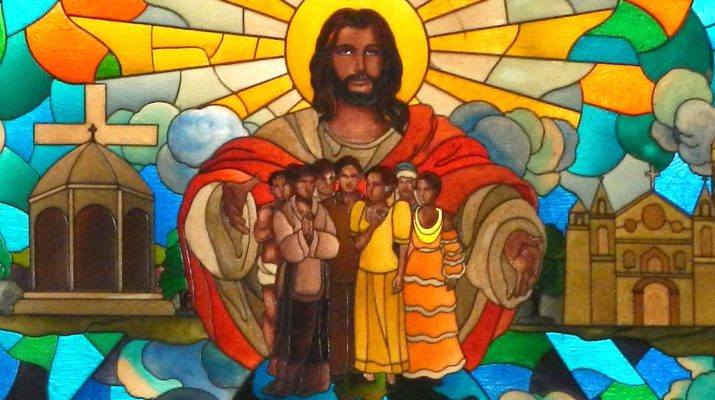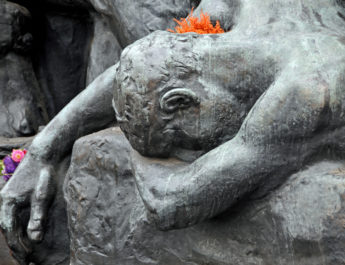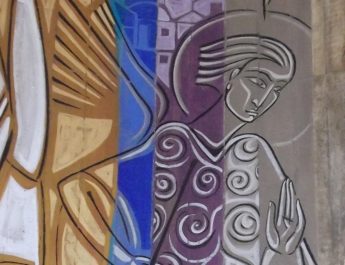John 7:37-52
Narrative Lectionary 427
37 On the lastA dayB of the festival,C the greatD day,
A “last” = eschatos. Related to eschaton (end, last); perhaps from echo (to have, possess, hold). This is last, end, extreme, final. It is often used to discuss the end times, prophecies of the future, and the afterlife. The branch of theology focusing on all these topics is called “eschatology.”
B “day” = hemera. Perhaps from hemai (to sit). This is day, time, or daybreak.
C “festival” = heorte. This is a holiday or feast.
D “great” = megas. This is big in a literal or figurative sense – great, large, exceeding, abundant, high, mighty, perfect, strong, etc.
while JesusE was standingF there, he cried out,G, H “Let anyone who is thirstyI comeJ to me,
E “Jesus” = Iesous. From Hebrew Yehoshua (Joshua, the Lord is salvation); {from YHVH (proper name of the God of Israel; the self-existent and eternal one); {from havah (to become) or from hayah (to come to pass, become, be)} + yasha (to deliver, defend, help, preserve, rescue; properly, to be open, wide or free, which implies being safe. So, in a causative sense, this is to free someone)}. This is Jesus or Joshua in Greek – the Lord saves or the Lord is salvation.
F “standing” = histemi. This is to stand, place, establish, appoint, stand ready, be steadfast.
G “cried out” = krazo. This is to cry out, scream, shriek. It is onomatopoeia for the sound of a raven’s call. Figuratively, this means crying out urgently without intelligible words to express something that is deeply felt.
H {untranslated} = lego. This is to speak, say, name, call, command. It is generally to convey verbally.
I “is thirsty” = dipsao. 16x in NT. From dipsa (thirst); from dipsos (thirst). This is thirst in a literal or figurative sense. Can also mean keenly desire.
J “come” = erchomai. This is to come or go.
38 and let the one who believesK in me drink.L As the scriptureM has said,
K “believes” = pisteuo. From pistis (faith, faithfulness, belief, trust, confidence; to be persuaded or come to trust); from peitho (to have confidence, urge, be persuaded, agree, assure, believe, have confidence, trust). This is to believe, entrust, have faith it, affirm, have confidence in. This is less to do with a series of beliefs or doctrines that one believes and more to do with faithfulness, loyalty, and fidelity. It is trusting and then acting based on that trust.
L “drink” = pino. This is to drink, literally or figuratively.
M “scripture” = graphe. From grapho (to write). This is literally writing, a document. In the New Testament, this is always used for scripture.
‘Out of the believer’s heartN shall flowO riversP of livingQ water.’”R
N “heart” = koilia. From koilos (hollow). This is belly or organs in the abdomen. So, it could be stomach, womb, or heart. Figuratively, this refers to one’s inner self.
O “flow” = rheo. 1x in NT. This is to flow or overflow.
P “rivers” = potamos. Related to “drink” in v37. 17x in NT. From pino (see note L above). This is a river, brook, or water. It can also be a riverbed flowing with heavy rain or melted snow (like an arroyo).
Q “living” = zao. This is to live literally or figuratively. It is used for life including the vitality of humans, plants, and animals – it is life physical and spiritual and life everlasting.
R “water” = hudor. Perhaps from huetos (rain); from huo (to rain). This is water literal or figurative. It is one of the roots that “hydrogen” and “hydroelectric” come from.
39 Now he said this about the Spirit,S which believersT in him were toU receive;V for as yet there wasW no Spirit, because Jesus was not yet glorified.X
S “Spirit” = pneuma. From pneo (to blow, breath, breathe hard). This is wind, breath, or ghost. A breeze or a blast or air, a breath. Figuratively used for a spirit, the human soul or part of us that is rational. It is also used supernaturally for angels, demons, God, and the Holy Spirit. This is where pneumonia comes from.
T “believers” = pisteuo. Same as “believes” in v38. See note K above.
U “were to” = mello. Perhaps from melo (something that one is worried or concerned about, something one pays attention to or thinks about). Properly, this is ready, about to happen, to intend, delay, or linger. This is just on the point of acting.
V “receive” = lambano. It does not refer to passive receiving of something, but active acceptance or taking of something whether it is offered or simply nearby. It focuses on individual decision and action.
W “was” = eimi. This is to be or exist.
X “glorified” = doxazo. From doxa (glory, opinion, praise, honor, renown; particularly used as a quality of God or manifestation of God – splendor); from dokeo (to have an opinion, seem, appear, suppose; a personal judgment; to think); from dokos (opinion). This is to render or hold something as glorious, to glorify, honor, magnify, or celebrate. This is ascribing weight to something by recognizing its true value or essence.
40 When they heardY these words,Z some in the crowdAA said, “This is reallyBB the prophet.”CC
Y “heard” = akouo. This is hear or listen, but it also means to understand by hearing. This is where the word “acoustics” comes from.
Z “words” = logos. Related to {untranslated} in v37. From lego (see note H above). This is word, statement, speech, analogy. It is a word that carries an idea or expresses a thought, a saying. It could refer to a person with a message or reasoning laid out in words. By implication, this could be a topic, line of reasoning, or a motive. It can be used for a divine utterance or as Word – Christ.
AA “crowd” = ochlos. Perhaps from echo (to have, hold, possess). This is a crowd, the common people, a rabble. Figuratively, it can refer to a riot.
BB “really” = alethos. 18x in NT. From alethes (true, unconcealed; true because it is in concert with fact and reality – attested. Literally, what cannot be hidden; truth stands up to test and scrutiny and is undeniable, authentic); from a (not) + lanthano (concealed, hidden, unnoticed; to shut one’s eyes to, unwittingly, unawares). This is truly, really, surely, truthfully, indeed. Properly, this is saying “in accordance with fact…” – what one is about to say can be proven and is true to reality.
CC “prophet” = prophetes. From pro (before, in front of, earlier than) + phemi (to declare, say, use contrasts in speaking to shed light on one point of view); {from phao (to shine) or phaino (to bring light, cause to appear, shine, become visible or clear)}. This is a prophet or poet – one who speaks with inspiration from God.
41 OthersDD said, “This is the Messiah.”EE
But some asked, “Surely the Messiah does notFF come from Galilee,GG does he?
DD “others” = allos. This is other, another. Specifically, it is another of a similar kind or type. There is a different word in Greek that speaks of another as a different kind (heteros).
EE “Messiah” = Christos. From chrio (consecrate by anointing with oil; often done for prophets, priests, or kings). Literally, the anointed one, Christ. The Greek word for Messiah.
FF “surely…not” = me. This is no, not, neither, or never. It can also be used when posing a question when the speaker expects the answer to be “no.”
GG “Galilee” = Galilaia. From Hebrew galil (cylinder, circuit, district); from galal (to roll in a literal or figurative sense, roll away, roll down, wallow, remove, trust). This is Galilee, meaning perhaps region or cylinder.
42 Has not the scripture said that the Messiah is descended fromHH DavidII and comesJJ from Bethlehem,KK the villageLL where David lived?”
HH “descended from” = ek + ho + sperma. Literally, “from the seed of.” Sperma is from speiro (to sow seed, spread, scatter); perhaps from spao (to pull, to draw a sword). This is something sown so it could be seed or offspring and descendants. This is where the word “sperm” comes from.
II “David” = Dauid. From Hebrew David (David); from the same as dod (beloved, love, uncle); the root may mean to boil, which is used figuratively to describe love. So, this implies someone you love such as a friend, a lover, or a close family member like an uncle. David’s name likely means something like “beloved one.”
JJ “comes” = eimi + erchomai. Eimi is the same as “was” in v39. See note W above. Erchomai is the same as “come” in v37. See note J above.
KK “Bethlehem” = Bethleem. 8x in NT. From beth lechem (Bethlehem); {from bayit (house, court, family, palace, temple); {probably from banah (to build, make, set up, obtain children; to build literally or figuratively)} + lechem (bread, food, loaf; food for people or for animals); {from lacham (to eat, feed on; figuratively, to battle as a kind of consumption/destruction)}. This is Bethlehem, meaning “house of bread.”
LL “village” = kome. This is a village as contrasted with a city that has a wall.
43 So there wasMM a divisionNN in the crowd because of him. 44 Some of them wantedOO to arrestPP him, but no one laidQQ handsRR on him.
MM “was” = ginomai. This is to come into being, to happen, become, be born. It can be to emerge from one state or condition to another or is coming into being with the sense of movement or growth.
NN “division” = schisma. From schizo (to split, divide, tear, sever; split in a literal or figurative sense). This is a split or a tear. Figuratively, it can refer to a schism, division, or dissension. This is where the word “schism” comes from and also “schizophrenia” (literally “split mind”).
OO “wanted” = thelo. This is to wish, desire, will, or intend. It is to choose or prefer in a literal or figurative sense. It can also mean inclined toward or take delight in. It can have a sense of being ready to act on the impulse in question.
PP “arrest” = piazo. 12x in NT. From piezo (to press down or together, to pack) OR related to biazo (to force, use power to seize); {from bia (strength, force, violence) or bios (life, livelihood, goods, wealth)}. This is to take, catch, squeeze, capture from hunting, or arrest. This is the root of “piezoelectricity.”
QQ “laid” = epiballo. 18x in NT. From epi (on, upon, among, what is fitting) + ballo (to throw, cast, place, put, drop). This is to place on, fall, lay, throw over, think about, waves crashing, emotions emerging.
RR “hands” = cheir. This is the hand in a literal sense. Figuratively, the hand is the means a person uses to accomplish things so it can also mean power, means, or instrument.
45 Then the temple policeSS went back to the chief priestsTT and Pharisees,UU who asked them, “Why did you not arrestVV him?”
46 The police answered, “Never has anyoneWW spoken like this!”
SS “temple police” = huperetes. From huper (by, under, under the authority of another) + eresso (to row). Originally, this was a rower or someone who worked the oars on the lower deck of a boat. It is used figuratively of someone under the authority of another who follows their commands. So this could be servant, attendant, or office. It could also be someone who is a minister of the Gospel.
TT “chief priests” = archiereus. From archo (to rule, begin, have first rank or have political power) + hiereus (a priest literal or figurative – of any faith); {from hieros (sacred, something sacred, temple, holy, set apart; something consecrated to God or a god)} This is a high or chief priest.
UU “Pharisees” = Pharisaios. From Aramaic peras (to divide, separate) and from Hebrew parash (to make distinct, separate, scatter). This is a Pharisee, a member of a Jewish sect active in the 1st century. Their name meant separate in the sense of wanting to live a life separated from sin. Whereas the Sadducees were part of the priestly line and inherited their religious position and responsibilities, Pharisees were regular people who studied the scriptures and offered guidance to regular folk. Sadducees were often wealthier and willing to sacrifice their identity to rub elbows with Roman society. Pharisees were often more concerned with what it meant to follow God without compromising what made them different as followers of God. Sadducees primarily believed in that which was written down (the first five books of the Bible) and Pharisees believed in the Bible and the traditions of the elders. Pharisees had a very wide range of interpretations and diversity of opinion. Their standard mode of religious engagement was lively debate with one another. To argue religion with another teacher was to recognize that they had something of value to offer.
VV “arrest” = ago. This is lead, bring, carry, guide, drive, go.
WW “anyone” = anthropos. Probably from aner (man, male, husband) + ops (eye, face); {from optanomai (to appear, be seen); perhaps from horao (become, seem, appear)}. This is human, humankind. Used for all genders.
47 Then the Pharisees replied, “Surely you have not been deceivedXX too, have you? 48 Has any one of the authoritiesYY or of the Pharisees believed in him? 49 But this crowd, which does not knowZZ the lawAAA—they are accursed.”BBB
XX “deceived” = planao. From plane (wandering – used figuratively for deceit, error, sin, fraudulence, or wandering from orthodoxy); from planos (wandering, misleading, a deceiver or imposter). This is to wander, lead astray, mislead, mistake, seduce, or deceive. Generally used to refer to sin – going off the right path or roaming from truth/virtue. This word shares a root with “planet” (as a heavenly body that wanders).
YY “authorities” = archon. Related to “temple police” in v45. From archo (see note TT above). This is ruler, leader, magistrate, official, prince, chief.
ZZ “know” = ginosko. This is to know, recognize, realize, perceive, learn. It is knowledge gained through personal experience.
AAA “law” = nomos. From nemo (to parcel out). Literally, this is that which is assigned. It can be usage, custom, or law. This word can be used for human or divine law. It can be used specifically for the law of Moses or as a name for the Torah (the first five books of the Bible). Sometimes it is used for scripture as a whole, used of the Gospel, or of any theology. It is also used for the “tradition of the elders,” which would be the oral Torah – the tradition of the laws plus their interpretations as they were passed down over time. We must carefully consider which meaning of “law” is meant when we interpret passages the word is found in.
BBB “accursed” = epikataratos. 3x in NT. From epikataraomai (to call for a curse); {from epi (on, upon, what is fitting) + kataraomai (to curse, execrate, doom); {from katara (curse, accursed; a curse as penalty); {from kata (down, against, throughout, among) + ara (prayer, curse, imprecation; a pray for evil); {probably from airo (raise, take up, lift, remove)}}}}. This is cursed, imprecated, destined for destruction.
50 Nicodemus,CCC who had gone to Jesus before, and who was oneDDD of them, asked,EEE
CCC “Nicodemus” = Nikodemos. 5x in NT. From nikos (victory, triumph – especially a conquest); {from nike (victory, conquest; figurative for what makes one successful)} + demos (district, multitude, rabble, assembly; Greeks bound by similar laws or customs); {from deo (to tie, bind, compel, declare unlawful)}. This is Nicodemus, meaning “victorious among his people.”
DDD “one” = heis. This is one, a person, only, some.
EEE “asked” = lego. Same as {untranslated} in v37. See note H above.
51 “Our law does not judgeFFF peopleGGG without firstHHH giving them a hearingIII to find outJJJ what they are doing,KKK does it?”
FFF “judge” = krino. To judge, decide, think good, condemn, determine, pass judgment, stand trial, sue. This is judging whether it is done in court or in a private setting. Properly, it refers to mentally separating or distinguishing an issue – to come to a choice or decision, to judge positively or negatively in seeking what is right or wrong, who is innocent or guilty. It can imply trying, condemning, punishing, or avenging.
GGG “people” = anthropos. Same as “anyone” in v46. See note WW above.
HHH “first” = proton. From protos (what is first, which could be the most important, the first in order, the main one, the chief); from pro (before, first, in front of, earlier). This is firstly, before, in the beginning, formerly.
III “giving…a hearing” = akouo. Same as “heard” in v40. See note Y above.
JJJ “find out” = ginosko. Same as “know” in v49. See note ZZ above.
KKK “doing” = poieo. This is to make, do, act, construct, abide, or cause.
52 They replied, “Surely you are not also from Galilee, are you? SearchLLL and you will seeMMM that no prophet is to ariseNNN from Galilee.”
LLL “search” = ereunao. 6x in NT. From eraunao (to search or examine); perhaps from ereo (to say, tell, speak, mean, command); perhaps from rheo (to say, speak of, command). This is to seek or examine. Figuratively, it can mean to investigate or desire to know.
MMM “see” = idou. From eido (to be aware, see, know, remember, appreciate). This is see! Lo! Behold! Look! Used to express surprise and or draw attention to the statement.
NNN “arise” = egeiro. This is to awake, raise up or lift up. It can be to get up from sitting or lying down, to get up from sleeping, to rise from a disease or from death. Figuratively, it can be rising from inactivity or from ruins.
Image credit: “Christ Cares for All” from the Church of the Natividad from Pangasinan, Philippines, 20th century.




